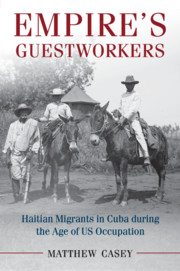Book contents
- Frontmatter
- Contents
- List of Figures, Maps, and Tables
- Acknowledgments
- Introduction
- Prologue: Experiencing the Unevenness of Empire
- 1 Making the Haitian Cuban Border and Creating Temporary Migrants
- 2 Leaving US-Occupied Haiti
- 3 Living and Working on Cuban Sugar Plantations
- 4 Picking Coffee and Building Families in Eastern Cuba
- 5 Creating Religious Communities, Serving Spirits, and Decrying Sorcery
- 6 Mobilizing Politically and Debating Race and Empire in Cuban Cities
- 7 Returning to Haiti and the Aftermath of US Occupation
- Epilogue: Enduring Legacies and Post-Colonial Divergences
- Bibliography
- Index
Introduction
Published online by Cambridge University Press: 27 April 2017
- Frontmatter
- Contents
- List of Figures, Maps, and Tables
- Acknowledgments
- Introduction
- Prologue: Experiencing the Unevenness of Empire
- 1 Making the Haitian Cuban Border and Creating Temporary Migrants
- 2 Leaving US-Occupied Haiti
- 3 Living and Working on Cuban Sugar Plantations
- 4 Picking Coffee and Building Families in Eastern Cuba
- 5 Creating Religious Communities, Serving Spirits, and Decrying Sorcery
- 6 Mobilizing Politically and Debating Race and Empire in Cuban Cities
- 7 Returning to Haiti and the Aftermath of US Occupation
- Epilogue: Enduring Legacies and Post-Colonial Divergences
- Bibliography
- Index
Summary
By the time he was thirty-five, Aurelio Castillo bore the telltale signs of a life spent cutting sugar cane on the plantations of eastern Cuba. His face, hands, and body were covered in scars from the machete wounds that were all too common in a world of dangerous work and periodic fighting. On his right arm was the distinct pockmark of a vaccination, a physical reminder that Castillo, a native of Haiti, had been recruited by a sugar company representative and injected by a company doctor in accordance with Cuban and Haitian law. Vaccination and work injury scars were not the only indelible marks on Castillo's body. There were others of his own making. On his right forearm was a tattoo of Cuba's patron saint with the year 1922 and a caption, in Spanish, that read “Remember the Virgin of Charity.” His left arm depicted a “bouquet of flowers, a nude woman and the initials A.C.Z.” The vaccination and machete scars evoke a world of harsh work conditions and strict state regulations. The tattoos tell of social relationships, religious beliefs, and personal meanings that managed to flourish amid this difficult and monotonous world.
This book is about the hundreds of thousands of Haitians like Castillo who migrated between Haiti and Cuba during the first four decades of the twentieth century. The marks on Castillo's body provide a parallel to one of the book's overarching arguments. Although sugar companies and state institutions exerted immense control over the movements and labor of their workforce, they never had the kind of absolute power they claimed. In exploring the areas where institutional power broke down, I show the ways that ordinary individuals influenced larger processes of state-building, plantation agriculture, and race-making in the early twentieth-century Caribbean. Throughout eastern Cuba, Haitians and individuals of other nationalities created networks of petty commerce, worship, and community embedded within sugar plantations, though ultimately extending beyond them – sometimes back to Haiti. For Haitians and other workers, these worlds of labor, leisure, and spirituality were not easily separable, a fact that Aurelio Castillo literally embodies. Furthermore, Haitians’ efforts to achieve a semblance of autonomy, often by collaborating with Cubans and individuals of other nationalities, shaped state policies, economic realities, religious beliefs, and ideas of race in both Haiti and Cuba at a foundational moment in their respective histories.
- Type
- Chapter
- Information
- Empire's GuestworkersHaitian Migrants in Cuba during the Age of US Occupation, pp. 1 - 24Publisher: Cambridge University PressPrint publication year: 2017

